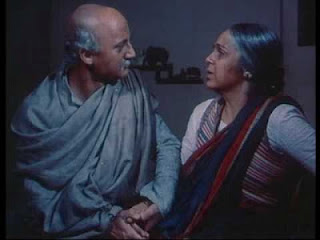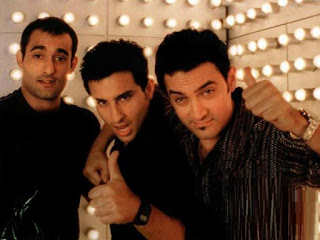By Thewhitescape
“Indian
cinema has virtually become a parallel culture. Talk of India with a foreigner
and debate virtually centres on Indian films,” said Amitabh
Bachchan.
 |
| Image Courtesy: http://indiatoday.intoday.in/ |
Cinema is the beautiful combination of art, literature and science. Art and literature are reflections of life representing the moments of life and science studies man and his world. So cinema, a combination of these three invariably presents man and his life in the society. Cinema undoubtedly is reflective of the society itself. What we see or do in reality is more often than not what we see on silver screen. It's not rare that we encounter incidents in our daily lives that are in most ways very similar to the ones that we witness in movies. We often get to see startling resemblances between events of real and reel life, be it films or documentaries.
In
Natyashastra, Bharatmuni declares that art is the search for truth. The aim of
life is not different and hence cinema, society and life are closely related.
Our life and the principles are influenced by the passage of time and changes
in the society. Cinema is inspired and influenced by the society and it
portrays it colorfully.
A Still from Dadasaheb Phalke's Raja Harishchandra
|
From Dadasaheb
Phalke to Farhan
Akhtar, every decade of
Bollywood has reflected
various hues and
aspects of real
life on reels
of cinema. When Dadasaheb
integrated centuries old
mythological narratives with
emerging medium of
cinema in forms
of films like Raja
Harishchandra and Kaliya-Mardan,
it was
instantly lapped up by audience
and showed spiritual
bent of mind of
society of those
times. Ashok Kumar starred
Kismet, released during
Quit India Movement, was a cinematic
rendition of resistance
against imperialistic British
by Indians.
Post independence Nehruvian
socialist era was
time of Guru
Dutt, Satyajit Ray and
Bimal Roy, ruthless perfectionists, who
vividly captured the
growing pains of
infant democracy and
universality of human
emotions in their
films. During the time
of 70s and
80s, with films like Ankur, Manthan and Saransh, art
cinema finally came
of age and
showcased common man’s
struggle with the system and
striving for basics
of life. Post 90s, when
Indian society woke
up to globalization and
liberalization, new-age
cinema makers, too
broke traditional Bollywood ’s
definitive cinematic boundaries.
 |
| A Still from Anupam Kher starrer Saransh |
With pots
of money pouring into India, Indian film industry too learned
to talk in
crores and filmmakers
went global, aimed for
Hollywood kind of
releases, and tried to
earn revenues from
satellites, video and other avenues apart from
box-office collections.
Catering to a
highly diverse society,
Indian film industry
is largest in
the world, churning out an
average of 800
films per year. The audience consists of an estimated
3.6 billion people with 14 territories in India and 52 counties across the
globe. As such, no film
producer and director
can vouch for
homogeneous consumption of his
films.
Directors like
Govind Nihalani, Shyam Benegal, who
are not burdened
to cater to
the masses, inescapably remind
viewers of refined
tastes - of hard facts
and realities of life
through their straight-in-the-face films. Then there
is entire breed
of film merchants
who serve to
the entertainment palates of
the majority by playing
it safe; by making
traditional commercial Bollywood
potboilers. Also there are
cerebral directors like
Nagesh Kukunoor and Madhur
Bhandarkar who delve
deep into stark
realities of everyday
life to give
us edgy cinema
like Iqbal, Chandni Bar, Girl friend, Joggers Park, Being Cyrus,
Dil Chahta Hai- which prick
our sense of
film-viewing in an entirely different
way. They handle topics which are sensitive and controversial as
relationship between a young woman and much older man, young man and older
woman, lesbian aspect of friendship, lives of bar dancers. Madhur Bhandarkar's
film Page 3 effectively brought out
the utmost details of the page 3 category people belonging to the upper class
society. This national award winning director also spilled the beans in his
film Fashion, about the dark,
gloomy, and pitiful state of affairs in the world of fashion, modelling and
glamour. These films, we all realize and understand, are the mere cinematic
versions of the unquestionable truth or fact. In more than a few occasions we
somehow identify with the characters in movies.
 |
| A Still from Aamir Khan starrer Dil Chahta Hai |
Romance,
popular novels, patriotism, underworld politicians, nexus are still the moving
themes and are projected without any hesitation. Devdas, Mangal Pandey, Veer Zaara and Parineeta belongs to this
group. Analyse the relation between the hero and the harlot portrayed in Mangal
Pandey, it was something unthinkable in old times, once again pointing towards
the mindset of the society and its changing maxims. Unfortunately the society
today is a witness to various ill doings, communal problems, deplorable events
and sheer malevolence. Few of the many plagues of the present society are
murders, rapes, suicides and to top it all is the utmost form of violence,
terrorism. The worst possible evil at present is undoubtedly terrorism and this
is an issue that has been dealt with in cinemas recurrently. Even if we attempt
to name a few movies having dealt with terrorism it would amount to many. All
this does nothing but evinces that cinema is a reflection of the society. In
film Corporate, we were provided
with a sneak peek of the sinister details of the world of business. The rampant
corruption in the business world was simply enacted in this film. Women getting
jobs in return for pleasure, cricketers participating in match fixing in
exchange for crores, teenagers taking to drugs, perversion leading to teenage
pregnancy, people going to the extent of murdering people over trivial matters
- we all get to hear such things, and subsequently we get to see these in
movies.
Film may be
bad or good, based on a fiction or a real story, centered around a village or
city life, but it explores the phenomenon that is man and his often
contradictory relation with the society. 2004 Dadasaheb Phalke award winner and
eminent director of Malayalam movies Mr Adoor Gopalakrishnan says, -“it is impossible to truthfully present
characters who do not represent social life in some way or the other. I can
ascertain that there are lively social issues in all my films”.
 |
| A Still from Madhur Bhandarkar's Corporate |
Social dynamics
have always regulated the content of cinema. The main
protagonist of any
film fights villains
who are manifestations of
contemporary societal evils - from village money-lender to
land-hawks to advocates of dowry, dons and
modern day terrorists. A
society, which is
highly tolerant despite
ethnic, religious and linguistic
cleavages, is visible
in rendition of
a religious bhajan
by Mohammed Rafi
in a role
essayed by Dilip
Kumar in the
film Ram Aur Shyam. Khans
from minority are the darlings of the masses. The biggest
super-star in Tamil
film industry Rajnikanth,
is a Marathi
by birth.
Indian cinema
has always tried
to showcase Indian
culture in all
its ramifications. Family ties, particularly, joint family
system and series
of rituals like
wedding, engagements,
celebrating of new-born
etc are always
present in our
films. There are feel-good
films like Bobby,
Kaho Na Pyar Hai,
which define puppy
love; Sholay, a
wholesome entertainment; Golmaal - healthy sprinkling
of humor; Border and LOC -stories of
supreme sacrifices of our valiant
soldiers, Murder and
Jism, which deal
with the theme of adultery; Black Friday - realistic
portrayal of 1993
bomb blasts– all ideas
picked up by
our social setup.
Oscar awarded/nominated
movies tell a different story. They emphatically declare cinema to be
reflection of the society. Films like Goodbye
and Good luck, Munich and Crash which won Oscars for best film, they
highlighted the political tension and changing world order after 9/11 attacks,
different assessments of the cause of Palestinian people, prejudice and social
segregation in the USA. Brokeback
Mountain discusses the taboo subject of homosexuality –man’s desires and
how they lead to the breaking of families. These are the issues of our time and
whether we like it or not, we have to address them. Cinema ultimately presents
the man in society with all its virtues and vices. Something’s in society and
life are too complex for oral transmission, so cinema makers make fiction out
of them to make them universal. The cinema is something between art and life,
unlike painting and literature; the cinema both gives to life and takes from
it.
 |
| A Still from Ang Lee's Brokeback Mountain |
The Indian
cinema has come off age with movies like Black. But the unfortunate part is
such movies are rare. The bulk of the films dished out to audience are based on
the so-called formula- a mixture of heroics, melodrama, violence, nudity, music
and catchy dialogues.
“Great films
will be made
when we become
a great audience,” said French author, Andre
Malraux. Indian filmmakers are often panned for making unreal cinema. But
with audience enlightening
up and graduating
to outside cinema,
cinema-makers have tough
job in their
hands to keep audience
glued to their
celluloid products. Cinema industry
is realizing that
they need to
be experimental and
open up to
new set of
ideas and shed
their old reservations
about audiences. Schlock cinema,
with lot
of plot-holes and
half-baked stories, are
becoming things of
yore. Simple relatable stories
about unassuming characters
from non–metro and
moffusils towns and
villages are flavor of
filmmakers. Time and again
cinemas have acted as a mirror to the society. Cinemas have persistently dealt
with the problems of the society, and brought out the darkest secrets of the
world as it is today. The thought that a movie always equals entertainment is
but a myth. I would like to salute the filmmakers, actors, and producers who
have done and are still doing their bit to let the people know about the
society better. So, as a conclusion I would like to restate and make clear that
cinemas are undeniably reflective of the society that we live in and the strong
link between reel and real is here to stay.
About Author -
This guest post is written by Thewhitescape, a social media nut, freelance writer, blogger, creative thinker, editor, fashion addict and a wanna be author based out of Hyderabad. Blog: http://thewhitescape.wordpress.com. Connect with Thewhitescape on Facebook Page. The views expressed by the author are personal.
Readers, please feel free to share your opinion by leaving your comments. As always your feedback is highly appreciated!
People who liked this also liked...



True cinema reflects the changes in society.
ReplyDeleteVery true... thanks a lot for sharing your thoughts! :-)
ReplyDeleteGood one! i do agree that changes in society reflect in society. and so do in music.
ReplyDeleteGOOD cinema is definitely reflection of the society. But the problem is the ratio of good is to bad cinema is such that we get to watch a lot of stuff that is objectionable and has no or very less relation to real life.
ReplyDelete